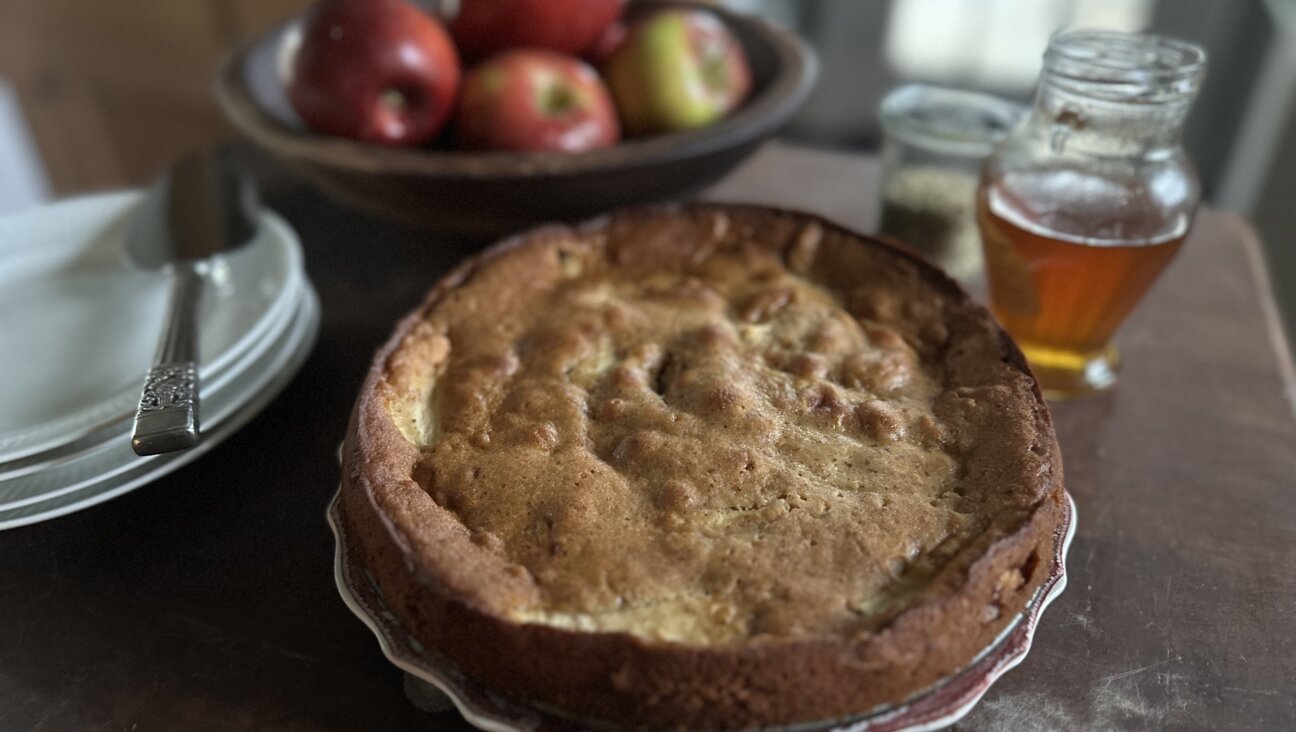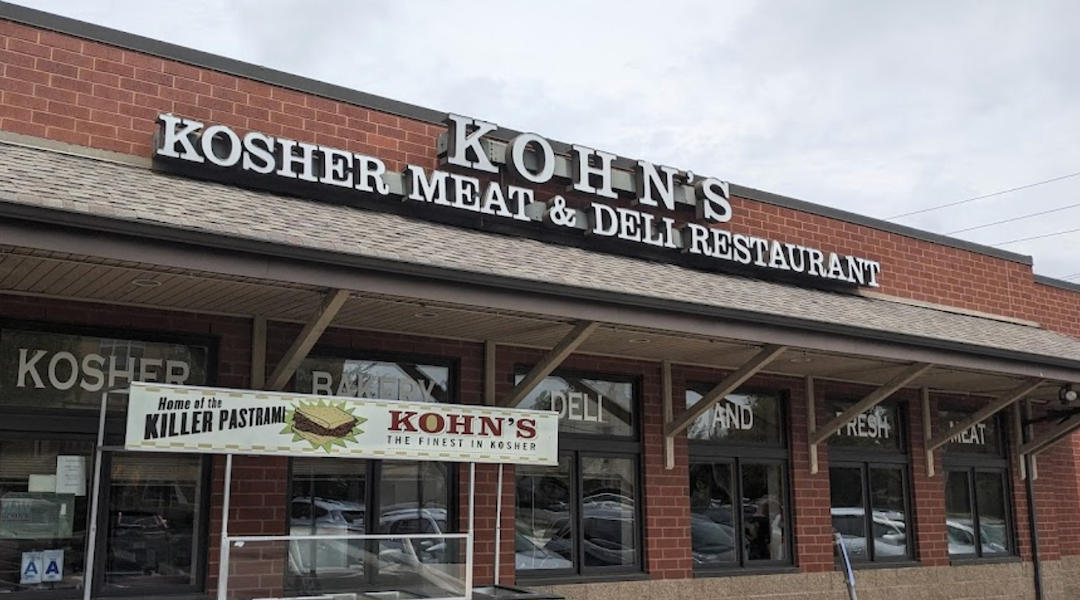The Little Creamery That Could

Lisa Gottreich with two of her goats Image by Alix Wall
This story first appeared on J. Weekly.
When Bohemian Creamery’s Boho Belle cheese was served along with fig sesame jam, arugula and balsamic vinegar to President Barack Obama at a brunch in Atherton, it was then, and only then, that Lisa Gottreich began to think that maybe she would succeed as a cheesemaker.
“I started to cry when I heard,” she said about the April fundraiser, where a San Francisco caterer had included her cheese on the event menu. “To make an agricultural, artisan food in California, you have to produce a product that you can’t afford to buy, and sell it to a place you could never afford to eat, and then maybe you’ll make it.”
Gottreich, 51, has been a cheesemaker for most of her life, but it turned from hobby to profession just a few years ago. At the time, she was working as an operations analyst, her 17-year marriage was falling apart, and she wanted to change the course of her life. “I decided I would do something that brought me joy,” she said. (She also quips that she traded in her ex-husband for goats.)
Gottreich, the product of a Swedish-Jewish home in West Marin, Calif. grew up around animals and enjoyed physical labor. “I like sweating. What’s wrong with hard work?” she asked. “If I had been a Jew in Egypt, I probably would have petitioned to stay a slave.”
She spent some time in Israel during high school, talking her way onto a kibbutz (she was younger than the minimum age of 16 for volunteers). She loved the experience and the feeling that “Israel still had a lot of socialist influence at that time.”
While attending U.C. Santa Cruz, Gottreich got more solidly connected with her Jewish identity, hanging out with other Jewish students and studying Hebrew. She considered returning to Israel for her junior year abroad, but it was around the time of the 1982 Lebanon War, so she decided to go to Padova, Italy, instead. It was there, she believes, that her palate started to develop.
While Gottreich says her mother was an excellent cook, her family wasn’t very food-centric as far as many Jewish families go. Yet she believes the time she spent in Europe and her European roots are to credit for her cheese-making savvy.
“I’ve developed a certain palate,” she said. “I invent all my cheeses. I have a profile in mind, and so far so good.”
Gottreich started Bohemian Creamery in 2009 with a partner, but today she runs it on her own. For the last three years the business has operated out of a leased space in Sebastopol, near the Bohemian Highway (hence the name).
Largely self-taught, Gottreich has a repertoire of 11 cheeses — the newest is made from water buffalo milk — that she describes as Italian-style, “which calls for lower salinity in the brine,” she said. Italian cheeses tend not to be as salty as some other European varieties.
“It’s maybe the third or fourth flavor you get,” she explained. “I like tasting the animal and milk and cultures and then salt, not as the first or second flavor. That might be the most obvious uniting characteristic of all my cheeses.”
Gottreich has her own herd of goats on the Creamery’s property, and she buys cow and sheep milk for her cheeses from neighboring farmers.
While she says she’s not usually one to enter contests, the one time she did, in the 2009 California State Fair, her Boho Belle won a gold medal. Despite Bohemian Creamery’s relatively low profile, it has managed to attract the notice of dozens of high-end cheesemongers and chefs at Bay Area restaurants, including Chez Panisse, Michael Mina and Jardiniere, which have Gottreich’s cheeses on their menus.
“Many people make a cheese and it’s proficient, but it doesn’t speak of a place like the way European cheeses do,” said Jeff Diamond, the owner of Farmstead Cheeses and Wines, which has locations in Alameda and Oakland. “But her cheeses taste and reflect her personality and reflect Sebastopol.
“You won’t find cheeses like this anywhere else in the world. They are a combination of her creativity, how her mind works, and how she combines cheese cultures and the molds that are inherent in her facility. Her Sonoma County version of Epoisses [a French cow’s-milk cheese] tastes unlike anything I’ve ever had.”
Added Liz Cutler Rubin, wine and cheese specialist at Bi-Rite Market in San Francisco, “More than many other cheeses, Bohemian gives the impression of an artisanal product. It is always inconsistent in terms of how it looks, never perfect, but its imperfections are why I love it so.”
Gottreich has two children, Rachel, 21, and Sam, 17, who “loves taking care of the goats.” The family belongs to Congregation Beth Ami in Santa Rosa.
She says her academic-minded parents don’t really understand her career choice. (Her sister, Emily, followed a more traditional path and is vice chair of the Center for Middle Eastern Studies at U.C. Berkeley.) But Gottreich has no doubt she’s on the right path.
“It’s very much the modern Jewish immigrant story, to come to the U.S. and your children will be doctors or lawyers. But when you go back and study Torah, you see what an agrarian religion Judaism is,” she said.
“I work hard and am conscious of the seasons. I know what the animals are doing, what grasses are growing and how it will affect the taste of my cheeses. I’m very happy with what I’m doing, I feel fully emancipated, and am making all my own decisions.”
Alix Wall is a personal chef in the East Bay and beyond. You can find her website here.
A message from our CEO & publisher Rachel Fishman Feddersen

I hope you appreciated this article. Before you go, I’d like to ask you to please support the Forward’s award-winning, nonprofit journalism during this critical time.
At a time when other newsrooms are closing or cutting back, the Forward has removed its paywall and invested additional resources to report on the ground from Israel and around the U.S. on the impact of the war, rising antisemitism and polarized discourse.
Readers like you make it all possible. Support our work by becoming a Forward Member and connect with our journalism and your community.
— Rachel Fishman Feddersen, Publisher and CEO
























